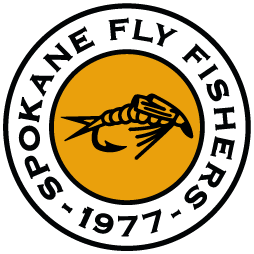A Hearty Thank You. Before proceeding, I want to offer a hearty “thank you!” to Mike Melmoth for his recent donation of over twenty volumes to the SFF Club Library! They will provide grist for some upcoming reviews and, more importantly, some wonderful reading for our membership. Thanks again, Mike!
A modern English Master with a Familiar Name. The first time you saw the Goddard Caddis pattern, did you marvel at the obvious caddis silhouette? Puzzle over how it could be cut out of spun deer hair? Wonder at the identity of the fly’s namesake? Well, the fact is this pattern was developed by a British fly angler and innovator of great renown “across the pond”, as well as here in America.
One of the volumes that came with the donation mentioned above is A Fly Fisher’s Reflections, a collection of many articles published mostly in Europe by John Goddard from the 1960’s through the century’s turn. Each chapter deals with some sort of discovery and innovation by this absolute
master of fly fishing detail.
I didn’t become aware of chironomid fishing until the late 80s or early 90s. Goddard’s first chapter on chironomid fishing recalls his efforts devising and fishing flies for this purpose in 1968!
Especially fascinating are the methods he devised for fishing chironomid pupae imitations in the surface film. He first did this by tying them on straight-eyed hooks (i.e., eyes neither bent upward or downward), then simply suspending three of them along a well-greased leader, tipped by a large floating sedge. They were not suspended with droppers; rather, they were simply strung along the at intervals with blood knots tied to either side to minimize their drift up or down the leader. (By the way, the British refer to chironomid fishing as “buzzer” fishing, and chironomids as “buzzers”. If you have ever listened to the midge hatch on Lake Lenice or Nunnally, back when they had truly great chironomid hatches, you will understand.)
Similar descriptions of Goddard’s development of sedges (caddis), mayflies, winged midges, and some terrestrials, are found in this collection. Particularly interesting is the chapter on snail rises (when fresh water snails actually rise to the surface, in apparent search for oxygen, and provide a “hatch” of sorts for trout). A pattern is even provided. I’ve never seen reference to this in any American work…
Both the patterns themselves and the methods evolved for fishing them are well described, usually in fascinating detail. Recipes are provided as well but, surprisingly, can be rather clipped. Stories of angling experimentation and resulting successes are provided throughout. Believing that to cast without actually targeting an individual fish is angling of a lower order, he identifies the fish to which he wants to cast and proceeds accordingly. Aside from fishing damsel nymphs just under and along the surface film, you will find no discussion of general casting and retrieving here. Nor, descriptions of general attractor patterns and their use. Goddard’s style reflects a gentle perfectionist who is not oppressively so. His prose is correct, if simple, very articulate English, which makes for very enjoyable reading.
Goddard expanded his fishing to virtually all parts of the globe (including the USA), saltwater and fresh, and related stories are contained in this volume. They are as enjoyable as those already described. This review is limited to the trout fly evolution and fishing method portion for purposes of brevity. Lefty Kreh, who wrote the forward to this volume, expressed his own great admiration for Goddard’s attention to detail. Once, Goddard lightly upbraided Kreh during a fishing outing for wearing a fishing shirt that was too bright a shade of green for the background foliage along the stream to be fished! When Kreh, who at first thought Goddard was kidding, later exchanged shirts for a softer tone, his fishing success that day improved markedly!
And what of the Goddard Caddis (or G & H Caddis, as it is known in Britain) pedigree itself? How did it evolve? Well, as a teaser, I am going to let you, the reader, find this out for yourself. I will simply tell you it is described somewhere in the volume – if you really wish to know, you will have to search for it by checking out A Fly Fisher’s Reflections!
